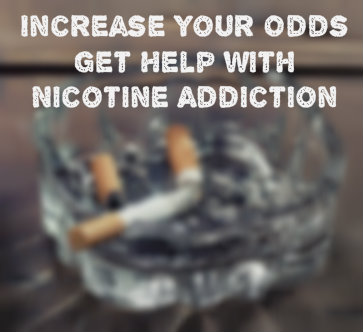The Odds For Quitting Smoking Triple With Counseling And Medication
Millions of cigarette smokers across the U.S. are addicted to nicotine, a natural ingredient in tobacco capable of producing harmful, long-term changes in brain chemistry just like a range of other legal and illegal substances of abuse. In most cases, people who attempt to quit smoking do so without the help of an addiction specialist or any other health professional prepared to deal with nicotine addiction. In a study published in March 2014 in the journal Addiction, a team of British and Dutch researchers assessed the likelihood that smokers addicted to nicotine will successfully quit using cigarettes without professional help.
The Basics Of Nicotine Addiction
 Nicotine addiction is related to a nicotine-induced chemical imbalance in the area of the brain responsible for producing pleasurable responses to various activities. This imbalance activates the pleasure center and gives a smoker an incentive to introduce nicotine into the brain again and again over time. This incentive is heightened by the fact that any single episode of nicotine exposure only briefly produces its pleasurable effects. Over 40 million American adults smoke cigarettes; since most habitual smokers are nicotine addicts, nicotine addiction constitutes the most widespread form of substance addiction in the U.S. More than two-thirds of the people who smoke cigarettes want to quit, according to figures compiled by the federal Centers for Disease Control and Prevention.
Nicotine addiction is related to a nicotine-induced chemical imbalance in the area of the brain responsible for producing pleasurable responses to various activities. This imbalance activates the pleasure center and gives a smoker an incentive to introduce nicotine into the brain again and again over time. This incentive is heightened by the fact that any single episode of nicotine exposure only briefly produces its pleasurable effects. Over 40 million American adults smoke cigarettes; since most habitual smokers are nicotine addicts, nicotine addiction constitutes the most widespread form of substance addiction in the U.S. More than two-thirds of the people who smoke cigarettes want to quit, according to figures compiled by the federal Centers for Disease Control and Prevention.
Smoking Cessation Techniques
The main smoking cessation technique available to a cigarette user who does not seek professional assistance is non-prescription nicotine replacement therapy. This approach relies on the use of over-the-counter nicotine-containing gum, lozenges or patches to gradually reduce an individual’s dependence on nicotine and help him or her avoid the unpleasant symptoms of nicotine withdrawal (which commonly act as a strong deterrent to smoking cessation efforts). Techniques used under the guidance of an addiction specialist or some other form of health professional include prescription nicotine replacement therapy (nasal sprays, inhalers or patches) and prescription nicotine-free medications such as varenicline (Chantix) or buproprion (Zyban), as well as forms of counseling that include short training and motivational sessions called brief interventions, longer group or individualized counseling sessions, remote counseling sessions that rely on phone or Internet technology and a form of in-person practical training called behavioral therapy. As a rule, a combination of professionally administered medication and counseling produces results that are superior to an all-medication or an all-counseling approach.
Chances Of Quitting Success
In the study published in Addiction, researchers from University College London and the Maastricht University Medical Centre used information gathered from a large-scale survey project called the Smoking Toolkit Study to compare the chances of smoking cessation success among people who make their own efforts to the chances of success among people who seek professional help. All told, data was collected from 10,335 smoking adults in England who had tried to stop using cigarettes one time or more in the year prior to the survey. The researchers broke these individuals down into four groups: people who received both professionally administered counseling and medication while trying to quit, people who only received professionally administered medication while trying to quit, people who tried to quit on their own with non-prescription nicotine replacement products and people who tried to quit on their own without using non-prescription nicotine replacement.
The researchers concluded that, compared to smokers who try to quit on their own without nicotine replacement products, smokers who try to quit while receiving professionally administered counseling and medication successfully stop smoking more than three times as often. Smokers who try to quit while only receiving prescription medication successfully stop smoking over 1.5 times more often than smokers who quit on their own without nicotine replacement products. Smokers who quit while only using non-prescription nicotine replacement successfully stop smoking about 0.96 times more often than those individuals who try to stop without any form of non-prescription medication or professional help.
The authors of the study published in Addiction note that, while there is some difference in the rates of smoking cessation success for people who only use over-the-counter nicotine replacement and people who use no assistance at all, the results in these two groups are close enough to qualify as “similar.” In contrast, people who receive a combination of counseling and prescription medication or just prescription medication clearly have improved odds of successfully quitting smoking.



